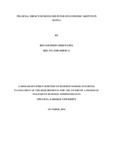FINANCIAL IMPACT OF DEVOLVED FUNDS ON ECONOMIC GROWTH IN KENYA
Abstract
The Kenya Government has tried to facilitate decentralization through initiatives like LATF,
DFRD, CDF and ESP. The biggest challenge remains in the constitutional framework in
tackling those inherent problems stemming from weak institutional capacity, poor legal
framework, and lack of community involvement and multiplicity of ghost projects
continuously undermine the essence of various efforts. The end result is that the strategies
take a short term nature, making it hard for them to resist periodical economic shocks.
This study aims at assessing the impact of the devolved system of governance on economic
growth in Kenya. This research relied heavily on annual secondary data from 1981 to 2012
which was obtained from the Government Printers, Kenya National Bureau of Statistics, The
Kenya National Library, The G.o.K Economic Surveys, The World Bank website and the
G.o.K Public Expenditure review reports. This tests the competing performance of various
decentralization strategies by the Government as to their impact on the economic growth.
Analysis was performed using regression techniques. Results for devolved funds indicated
that in the long run DFRD, CDF, LATF and ESP were found to be insignificantly related to
GDP. The parsimonious long run model also found that total devolved funds allocations and
the dummy for ESP was insignificantly related to long-run GDP. Short run DFRD
allocations were significantly related to short run GDP. Therefore, increases in short run
DFRD allocations lead to an increase in short run GDP. On the other hand, the short run
CDF allocations, short-run LATF allocations and ESP was not significantly related to short
run GDP. The parsimonious short run model also found that total devolved funds allocations
were significantly related to short run-run GDP. This implied that an increase in total
devolved funds in the short run led to an increase in short run GDP. It is recommended that
the government should increase the total amount of devolved funds as this stimulates growth
in the short run. Specifically, more funds should be allocated to the current devolved
Government structures as opposed to the traditional DFRD as opposed to LATF, CDF and
ESP.

